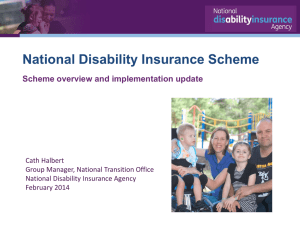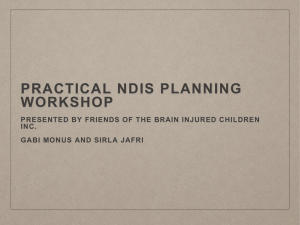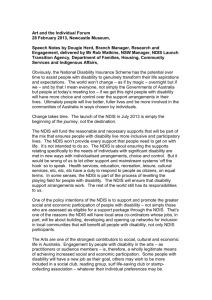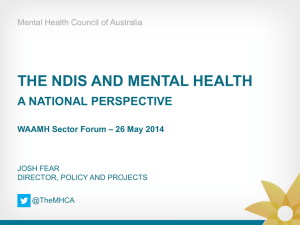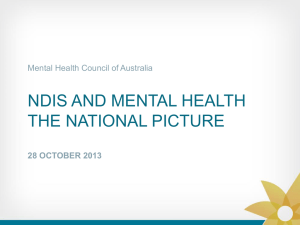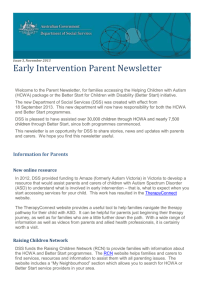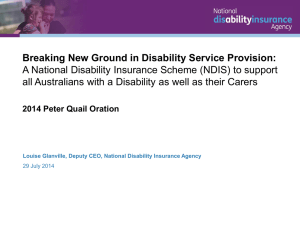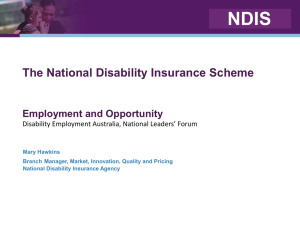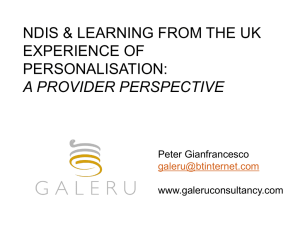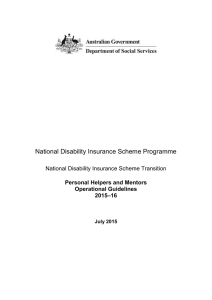Funding Round Summary
advertisement
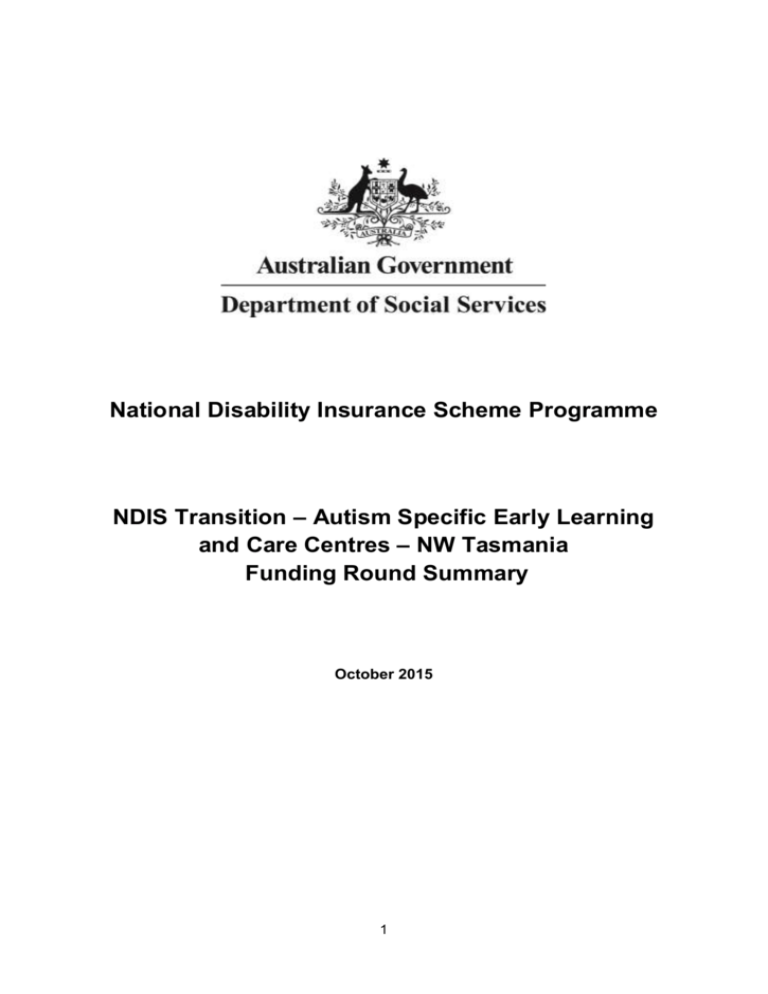
National Disability Insurance Scheme Programme NDIS Transition – Autism Specific Early Learning and Care Centres – NW Tasmania Funding Round Summary October 2015 1 National Disability Insurance Scheme Transition The National Disability Insurance Scheme (NDIS) is the new way of providing individualised support for eligible people with permanent and significant disability, their families and carers. The changes that are required to existing disability support systems are significant. Arrangements are being made to ensure the NDIS can be introduced gradually, ensuring a smooth transition for people with disability and support providers. From 1 July 2013, the first stage of the NDIS rolled out in South Australia, Tasmania, the Barwon area of Victoria and the Hunter area in New South Wales. Western Australia, the ACT and the Northern Territory joined the launch in July 2014. From 1 July 2015 the NDIS started in the Nepean Blue Mountains area, and from 1 July 2016, the NDIS will begin to be available in other parts of New South Wales and Victoria. The NDIS Transition programme component supports the market, sector and workforce transitioning to the NDIS environment by funding eligible organisations that provide: early intervention service, information and support to eligible children with a disability and their family and carers; short-term or immediate respite to carers of people with severe or profound disability and respite services to young carers at risk of not completing secondary education; outside school hours care for teenagers with disability; Australian Disability Enterprises assisting supported employees; and support services for people whose lives are affected by mental illness. Selection type This selection is a restricted process. Eligibility The following entity types meet the eligibility requirements to be invited to apply for a grant under these Activities: Incorporated Associations (incorporated under state/territory legislation, commonly have 'Association' or 'Incorporated' or 'Inc.' in their legal name) Incorporated Cooperatives (also incorporated under state/territory legislation, commonly have ‘Cooperative' in their legal name) Companies (incorporated under the Corporations Act 2001 – may be a proprietary company (limited by shares or by guarantee) or public companies) Aboriginal Corporations (incorporated under the Corporations (Aboriginal and Torres Strait Islander) Act 2006) Organisations established through a specific piece of Commonwealth or state/territory legislation (public benevolent institutions, churches, universities, unions etc.) Partnerships; Trustees on behalf of a Trust; and Where there is no suitable alternative, an individual or - jointly and separately – individuals How much? Up to $2.87 million (excluding GST) is available from 1 January 2016 to 31 December 2018. 2 Closing Date and Time Applications should be submitted by 2:00pm AEDT Tuesday, 17 November 2015. Who to contact? Please email your enquiries to: grants@dss.gov.au Grant objectives The NDIS Transition programme aims to manage the transition of existing activities identified to ensure: existing clients are sensitively transitioned into the NDIS in line with the full roll-out of the Scheme; services and service providers are transitioned gradually to the NDIS in line with the full roll-out of the Scheme; continuity of service throughout trial sites for clients that cannot access individualised packages under the NDIS; and an effective framework for transitioning the information, linkages and capacity building elements of transitioning programmes to provide systemic level support. The NDIS will support choice and control by providing needs-based, individualised funding to be used in a market-based environment. This will be a large shift for providers and clients currently delivering and receiving services under transitioning programmes. In particular, over time, there will be a move away from grant and block funded ‘one-size’ fits all services towards a purchaser/provider model individually funded by the choice of consumers. While there will be some provision for information, linkages and capacity building as well as individually funded services, disability services will be provided in line with this new approach, wherever possible. All grant recipients funded under the NDIS Transition programme will, therefore, be required to work closely with the Department of Social Services (DSS) and the NDIS to make the shift to this new model. Please note that the Autism Specific Early Learning and Care Centres (ASELCCs) will continue to receive block funding until 30 December 2018. For the duration of these agreements, the ASELCCs will not transition to the NDIS. Autism Specific Early Learning and Care Centres (ASELCCs) Each ASELCC is to provide a minimum of 20 full time equivalent long day care places to children with Autism Spectrum Disorder (ASD) aged zero to six years. Children filling these places will be provided with autism specific support in a long day care setting. Children must be provided with support to transition to further educational or therapeutic settings, and those accessing the service in the year before formal schooling must be provided access to an early childhood education program with appropriate autism specific support. A key component of the ASELCC services is the collection of a range of data measures that assess outcomes for children attending the centre. Data collected by the ASELCCs will contribute to research into the effectiveness of early intervention in a long day care setting. The funding provided by the Australian Government towards the operation of the ASELCCs will meet the following objectives: 3 1) Ensure that all children attending the ASELCC: are provided with autism-specific individual and group support and intervention strategies that develop their capacity to participate in child care, early learning and education settings; have opportunities for integration and interaction with other children; and are supported with transitions, particularly in the year before formal schooling so that they can reach their full potential in further educational and therapeutic settings. 2) Provide families of young children with ASD increased access to high quality and affordable early learning programs in a long day care setting to support their capacity to: participate in the community (i.e. work/ study); and manage the needs of their child/children with ASD. 3) Support the ASD sector by: contributing to strategies that improve the access of children with ASD to early childhood education programs; facilitating research and interventions for children with ASD and the development of best practice; and contributing to the development of workforce capability. Strategies to achieve the objectives outlined must target the unique requirements of each ASELCC’s local community. Additional information is available in the ASELCC Operational Guidelines. Statement of Requirement DSS is seeking a new provider to take over delivery of the NW Tasmania ASELCC as outlined above. The new provider can choose to take on the existing staff and service delivery model, although DSS is open to other proposed approaches. The successful candidate will be required to work closely with DSS and the existing ASELCC provider to ensure a smooth transition. The long day care services of the ASELCC must be delivered in accordance with all relevant health and safety requirements and all licensing, certification, or registration requirements in the area in which they are operating. Further details are provided in the ASELCC Operational Guidelines, Section 7.5.3 – Legislation, Guidelines and Regulations. This service must continue to be delivered at the current site: 34 Alexander Street, Burnie, Tasmania. As part of the agreement with DSS, the successful candidate will be required to sign a ‘Purposes Deed’ agreement or other documentation, requiring that the building operate children’s services (which could include an approved child care centre), until 30 May 2030. For the period of funding received for the ASELCC initiative, the building must be used to operate an ASELCC in accordance with the Grant Agreement and relevant Guidelines. The NW Tasmania ASELCC must be delivered in accordance with the NDIS Transition Programme Guidelines and the ASELCC Operational Guidelines. 4 Selection Criteria The equally weighted selection criteria that may be used for any funding process under the NDIS Transition programme are: 1. demonstrate your understanding of the need for the funded Activity in the specified community and/or the specified target group; 2. describe how the implementation of your proposal will achieve the Activity objectives for all stakeholders, including value for money within the Grant funding; 3. demonstrate your experience and/or capability in effectively developing, delivering, managing and monitoring activities to achieve Activity objectives for all stakeholders; 4. demonstrate your organisation’s capacity and your staff capability (experience and qualifications) to deliver the Activity objectives in the specified community and/or the specified target group. If you intend to retain existing ASELCC personnel, please make this clear; and 5. describe and demonstrate a service delivery model that includes effective partnerships, linkages and referral pathways that directly contribute to the Activity outcomes. Multicultural Access and Equity policy Australia’s Multicultural Access and Equity Policy: Respecting diversity. Improving responsiveness obliges Australian government agencies to ensure that cultural and linguistic diversity is not a barrier for people engaging with government and accessing services to which they are entitled, for example, by providing access to language services where appropriate. Grant applicants should consider whether services, projects, activities or events may require the use of professional translating or interpreting services in order to communicate with non-English speakers. If your Application Form states that a budget is required, costs for translating and interpreting services should be included in your application. Assessment The Assessment Team may be comprised of Department of Social Services (DSS) officers from each state/territory and national offices. Teams will undertake training to ensure consistent assessment for all applications received. The Assessment Team will be bound by the APS Code of Conduct and the Secretary’s Instructions. Probity The selection of funding recipients must be fair, open and demonstrate the highest level of integrity. The following probity principles will be applied through all stages of the selection process: a. b. c. d. e. fairness and impartiality; consistency, accountability and transparency of process; security and confidentiality of information; identification and resolution of conflicts of interest; and compliance with legislative obligations and government policy. These principles are intended to achieve an equitable, justifiable and sound process. Adherence to the probity principles means that everyone involved with the selection process will act: 5 f. impartially; and g. with integrity, including avoiding actual or perceived conflicts of interest. A Probity Advisor may be appointed for the Activity. The role of the Probity Advisor is to assist DSS meet its probity obligations in relation to the Activity by ensuring that the selection processes are defensible and will withstand external and internal scrutiny. The role of the Probity Advisor is to independently monitor procedural aspects of the selection process to ensure compliance with the relevant Programme Guidelines and to advise DSS in relation to such matters. The Probity Advisor plays no part in the assessment of applications. Programme Guidelines The Programme Guidelines Overview provides the key starting point for parties considering whether to participate in the activity and forms the basis for the business relationship between DSS and the funding recipient. Applicants are strongly advised to read the Programme Guidelines Overview prior to completing an Application Form. How to Apply Please read and complete the declaration part of the Application Form carefully. Ensure all responses are true and accurate. Click the Submit Application button and follow the instructions provided. All questions will be verified. Any incorrect or unanswered responses will be displayed for your correction. The Application Form will not submit until all responses have been verified. Upon successful submission you will be issued with a confirmation receipt and email. Submission may take several minutes. Please be patient and do not close the Application Form before receiving confirmation. Do not attempt to submit the application more than once. If you do not receive confirmation or you experience difficulties submitting the Application Form, please call 1800 020 283. Grant Agreement Information The Grant Agreement is a performance-based, legally enforceable agreement between the Commonwealth (represented by DSS) and the successful applicant that sets out the Terms and Conditions governing the funding to be provided. The type of Grant Agreement entered into will be influenced by the nature of the Activity, the assessed Activity risk level, the length of the Activity and the value of the Activity. The executed Grant Agreement represents each grant provided within it and the relevant Activity and supersedes all prior representations, communications, agreements, statements and understandings, whether oral or in writing. Questions Responses to any questions will be provided to all applicants. 6


